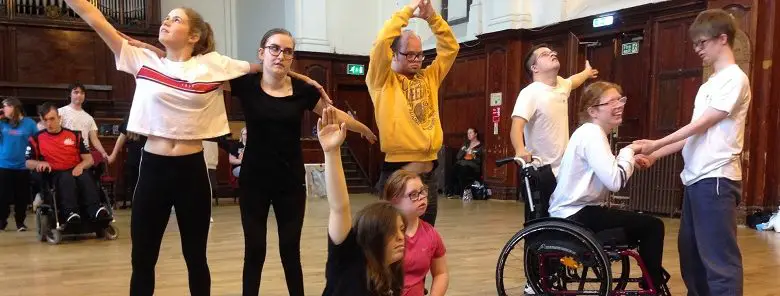
Getting into the arts – no matter what your disability
The UK has a fantastically creative and inclusive arts scene, with plenty of opportunities for disabled people to express themselves. Able magazine, who we’ve partnered with, recently wrote about how much is out there – from drama and dance to photography and painting. Read on to find out exactly how you can get into the arts, whatever your disability might be.
There are lots of opportunities for disabled people to engage in the arts, with benefits for doing so not just confined to enhanced creativity. Getting ‘arty’ can give you the chance to gain new skills, to look at things from a new perspective, build confidence and meet like-minded people.
According to Damien McGlynn, of arts participation charity, Voluntary Arts, getting creative is a life-affirming experience. “Having an outlet for creative expression is an essential part of everyone’s life and has a positive impact on people’s wellbeing.”
Whether it’s joining a drawing class or taking to the stage with a local theatre group, participating in the arts is hugely rewarding. The arts are also highly adaptive, so you can bring your own unique experiences and participate largely on your own terms. Here are just a few ideas to inspire you to channel your inner ‘arty’…
Inclusive dance classes
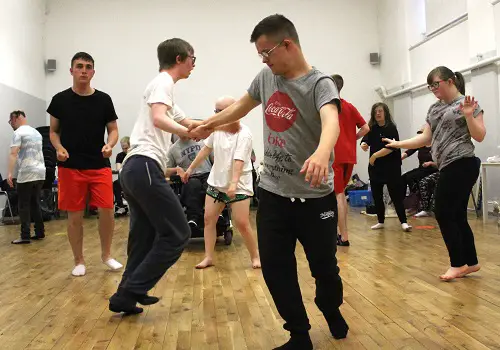
As one of the most expressive art forms, dance is more popular than ever, thanks in part to the influence of TV’s Strictly Come Dancing but also due to improved engagement and participation. If you fancy having a go, then dance can be hugely beneficial.
From salsa to classic ballroom, not only can adapted dance help with fitness, weight and mobility but it’s also a great social activity. A typical dance class costs between £5 and £10 for a session and most accredited dance schools can cater for people with physical or learning disabilities.
To find local dance classes check out the easy-to-use Exercise, Move, Dance website. Glasgow-based charity, Indepen-Dance, also runs inclusive dance classes for able-bodied and disabled people.
You could also consider wheelchair dancing – an exhilarating dance form suitable for pleasure or for competition. There are groups in England and Scotland – for more information, visit the Wheelchair Dance Association.
Drama groups for disabled people
If you like a good drama, then amateur dramatics could be for you. Most theatres offer disability access and also have a programme of community participation and theatre courses you could consider. Alternatively, contact the regional office of a national disability charity, such as Scope or Mind for details of specific drama groups and courses for disabled people.
Derby-based Hubbub is just one example of a local theatre group that hosts drama classes and workshops for disabled adults and also stages performances with mixed able-bodied and disabled casts. Mind the Gap in Yorkshire and Birds of Paradise Theatre Company in Glasgow also offer similar opportunities.
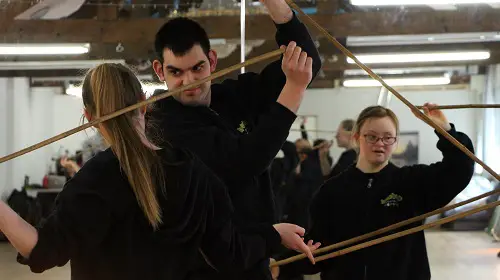
Drawing and painting with a disability
There are many therapeutic benefits to painting and drawing and whatever your skill level, there is a Picasso, of sorts, in all of us. Getting involved in painting and drawing doesn’t have to be expensive or complicated. It can be as simple as working with a pad and pencils or paints at home but for added social benefits, you could join a local art group or class.
Check out your local adult education centre for evening classes or short courses – most venues should have disability access, but it’s worth checking. Or there are organisations that run classes tailored for people with physical or learning disabilities. Arts Disability Online hosts a directory of organisations that provide visual art classes and programmes.
Inclusive music
If live music is your thing but you’re put off by concerns over accessibility, check out the websites of individual venues to see what they offer in terms of access and facilities, event experience and support – you might be surprised at what’s available to you.
According to disability charity, Attitude is Everything, who work to improve deaf and disabled people’s access to live music, over 170 venues in the UK have so far signed up to their accessible charter.
There are also plenty of opportunities for you to get involved in making music, either learning or participating – both provide a great way to get out and make new friends. Test out your vocal chords in one of the growing number of community choirs around the country. Chiors.org is an online directory listing more than 420 community choirs from across the UK.
The number of signing choirs for deaf and hearing-impaired people is also on the rise. Search ‘signing’ on Making Music to find one near you.
Meanwhile, Music for All, aims to get more of us to play an instrument and holds ‘Learn to Play’ days around the country.
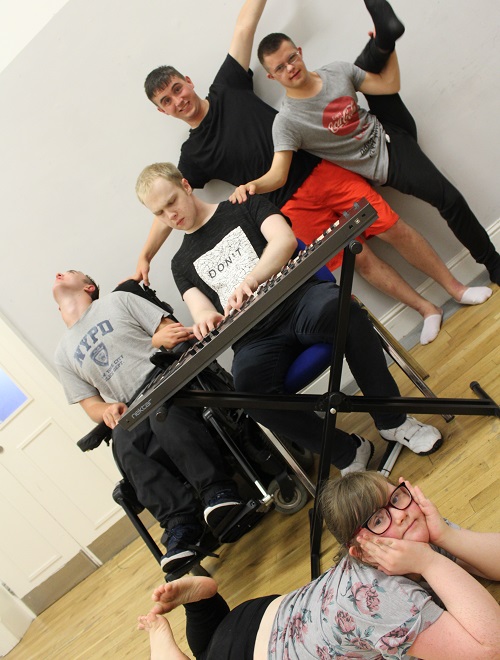
Crafts for people with disabilities
For something a bit more down to earth, woodcraft is a fun activity to try and can also be a great stress-reliever. Workshops can be readily adapted for wheelchair use and, as well as creating something beautiful, it’s also a chance to learn some practical skills. From crafting wooden bowls and carved platters to larger items of furniture, woodwork is both creative and deeply satisfying.
Contact your local adult skills and community learning services for more information on courses available or for details of local groups that provide woodworking classes. The network Men’s Sheds supports activities that help to prevent isolation and The Disabilities Trust is also a good source of information.
Ceramics clay is a wonderful medium to work with, making it a therapeutic way to release your tension – and inner creative. Adaptive to differing physical abilities, ceramics and pottery are usually seated activities, so are ideal for wheelchair users or people with limited mobility.
Your local adult education service will have details of ceramics courses and community workshops that are suitable for disabled people. ClayCraft magazine also has an excellent UK-wide directory of ceramics and pottery courses, while Museum Crush lists smaller independent courses.
Disabled photography
With the advent of the smartphone, we can all be photographers. Photography is a great way to document and relay a story or experience.
Whether you choose to informally document your particular viewpoint or look to develop your skills and technical knowledge within a group or class setting, photography is an adaptable way of engaging with the arts.
From those based on simple ‘point and press’ digital cameras up to using a digital SLR, there’s a wide variety of community courses for all levels and abilities. As well as exploring local photography groups and courses, check out organisations such as the Disabled Photographers Society for ideas and inspiration.
Disability and comedy
If you’ve been inspired recently by the success of Britain’s Got Talent winner, Lost Voice Guy (aka Lee Ridley), you’ll be pleased to know that there’s plenty of opportunities to try comedy, even if you don’t ever take to the stage. Yes, it can be nerve-racking, but comedy courses and groups can really improve writing skills, build your confidence, and of course, give you a good laugh too!
A great first port of call is The Comedy School, which runs a six-week intro to comedy course. The Two Can Theatre is another initiative for regional courses specifically for disability- led comedy.
So, you can see that the arts are highly adaptive, so you can bring your own unique experiences and participate largely on your own terms.
Able magazine
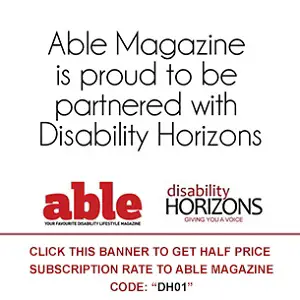
This year marks 25 years since the first issue of Able magazine rolled off the press. Able magazine has been a leading contributor and analyst regarding ‘What disabled people can do, not what they can’t’.
To keep the celebration vibe going throughout their silver jubilee, it’ll be treating readers to great giveaway prizes every month until the end of 2019 and will be putting together a very special 25th Anniversary Edition for its May/June 2019 issue. Find out more about Able’s Silver Jubilee on its website.
Our partnership with Able magazine means that you can get 50% off the price of the subscription – simply use the code DH01.
By Alison Dando
More on Disability Horizons…